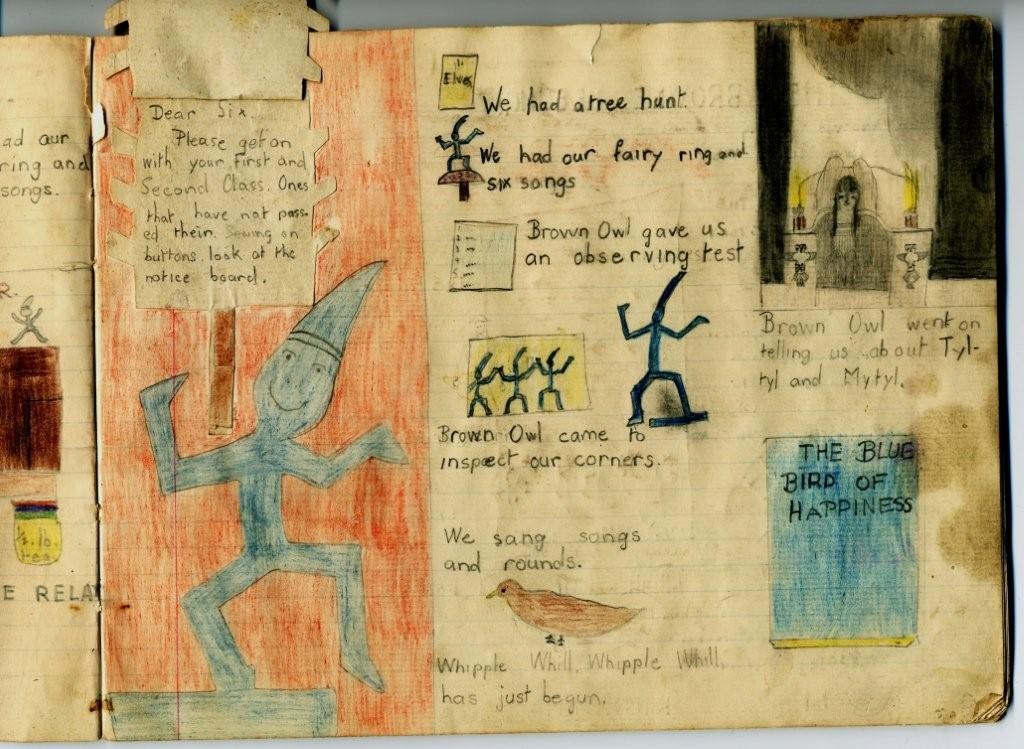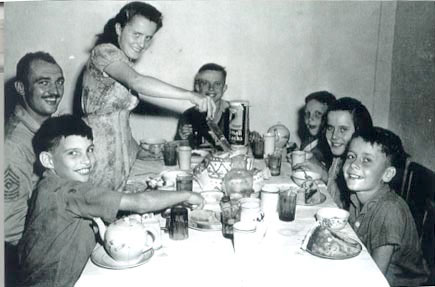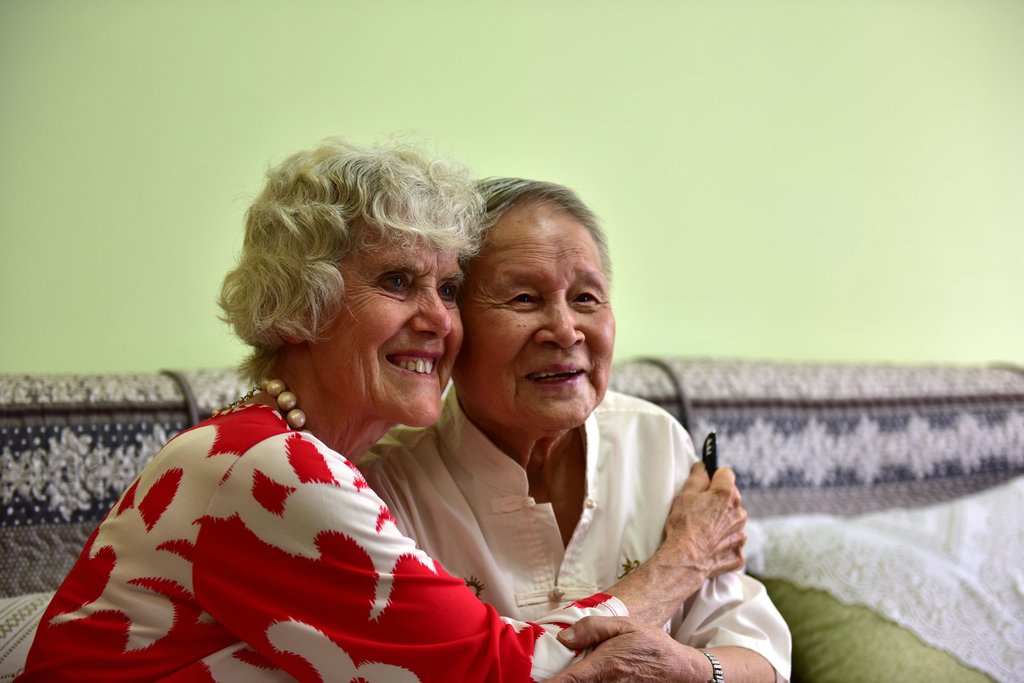Last year we attempted to be cool and hipster and made an effort to return to vinyl. My husband and I are old enough to have had records as children, progressed through cassettes and CDs, streaming, and now we’re back to owning records, and occasionally raiding our parents’ amazing collections. When we first set up our new turntable, we had to coach the kids: this is a needle, and these are the grooves in the record. When they’re in sync, beautiful music happens. When the needle can’t find the groove, some damage can occur, and at the very least, it sounds awful.
I first heard the story of Mary Taylor Previte a few years ago. She was featured on an episode of the podcast Reply All. Mary’s story inspired an author who was looking to write a teasing sort of book about Girl Guides, what we in America would know as Girl Scouts. In doing research, this author discovered that a contingent of Girl Guides had once spent four years in a concentration camp in China. That’s when she encountered Mary.
Mary and her four siblings were living in China because their parents were Methodist missionaries. Mary’s great-grandfather was J. Hudson Taylor, the first British missionary to the country. The children were sent to a boarding school in Chefoo, China, in 1941, for a traditional British education. Mary remembered being in the middle of Latin class when the Japanese soldiers arrived. She was learning to conjugate verbs. In a moment, the students and staff were prisoners of war.
After the students and teachers were relocated to the Weihsien concentration camp, the teachers, or “Brown Owls” as the Girl Guides called them, wasted no time in claiming what little normalcy they could preserve. This was a work camp, so the prisoners were expected to do their share, children included. Mary and her siblings swabbed latrines, mended clothes, and carried coal dust, because they weren’t allowed coal. In spite of everything, the teachers decided that they would preserve the children’s normalcy by taking them through their usual routines.
The children were expected to wash themselves, come to morning meetings, and go through their lessons: English, Bible, Latin, and the rest. Teachers still fussed and scolded about proper table manners. In their free time, boys and girls worked to obtain badges as Scouts or Girl Guides. They played marbles. Another adult POW, whom the children called “Uncle Eric,” tutored students in science and organized races in the courtyard for the young ones. His full name was Eric Liddell. You might know his story from the film Chariots of Fire.

Those of us first encountering this story might protest. How could rational adults expect routines and compliance from children under such duress? But no, Mary said, on the contrary — in those horrible days, the structure served as a kind of “security blanket.” In the middle of the worst conditions imaginable, the adults in their lives pressed ahead and attempted to give childhood back to the children. One of my favorite moments in the Reply-All episode is when Mary recounted her triumph in the pot-bellied stove “contest” — a game concocted to see who could keep the stove hottest the longest. She and her partner Marjorie won, and decades later, you can hear the pride in her voice.
“Don’t misunderstand me. I’m not saying this was fun city. I’m telling you we lived a miracle where grownups preserved our childhood,” Mary said. “Awash in a cesspool of every kind of misery, Weihsien was, nonetheless, for us, a series of daily triumphs.” They made games and contests out of catching rats that would run over the beds at night; they practiced the routine of clearing out bedbugs; they counted up the flies they killed.
Weeks stretched into months; months turned into years. Mary marked birthdays with the help of her teachers; one year, she received an entire apple, a lavish gift. The teacher showed her how to peel it and fry it into a “blossom.” She reported that she’d never had a finer birthday cake. As school progressed, the first set of sixth-year students sat for their exams, and all of them passed. The same thing happened the next year, and the next. After the war was over, Oxford University verified the test results from Weihsien, and they found an almost-perfect passing rate from students at the camp.
But more than academic victory, daily life was won in preserving the children’s hearts and spirits. Mary recounted the songs they would sing: “God is Our Refuge and Strength,” “Day is Done,” and others, some even poking fun at the situation of being in a concentration camp. She said,
…one of the things that we sang when the Japanese were marching us into concentration camp was the first verse of Psalm forty-six: ‘God is our refuge, our refuge and our strength’ and on it goes, ‘in trouble we will not be afraid,’ all of these words, just sung into our hearts, that sticks. It’s like you’ve got a groove, sticking in the gramophone record. I am safe, I am safe, I am safe. That was just profound.
All told, Mary and her siblings were at the camp for four years of their childhood. On August 17, 1945, Mary was in the infirmary, sick to her stomach, when suddenly there was the sound of a plane and screams of joy. Americans were waving from the plane to the prisoners in the yard below. Seven paratroopers glided to the ground and were greeted in the fields by jubilant prisoners. The captain was carried back the mile to the camp on starving men’s shoulders. A victory march broke out, followed by the Star-Spangled Banner. The makeshift Salvation Army band in the camp had been practicing for this moment for years, anticipating the day when rescue would come.

Mary and her siblings were eventually reunited with her parents, who had escaped to another part of China. They had been separated for five and a half years. When they arrived back with their parents, they met a five-year-old little brother they had never known.
Mary’s story makes me pause and think, what kind of grooves am I creating in my own soul and those of my children? What do they hear repeated? What do I repeat to myself? Am I equipping myself and my family to have the right perspective on the events of 2020? There is so much grief, so much loss. Yet God is still at work. Our faith, sunk down deep in our souls by routine and song, has the capacity to sustain us and our loved ones. I forget this too easily.
This story has renewed my resolve again to push back against the darkness: to turn off the constant news feed and remember what is true in every year, election, pandemic, or not. God is our refuge and strength, we will not be afraid. These things are true even in a season of widespread global suffering. Humans, sustained by faith in the living God, have a great capacity to do hard things with grit and grace.
Here’s one song that helps my family to find the “groove, sticking in the gramophone record,” as Mary would say. Sandra here calls us to “sing our way forward.” I think the Brown Owls would approve.
It would come to light after the war that Mary’s father helped over 1,000 people escape into safety. Mary Taylor Previte eventually went on to become an English teacher in New Jersey. She served on the local school board and then in the New Jersey State Assembly. During her long life, she tracked down those paratroopers from liberation day at the camp, eventually flying to China to say thank you. There are too many fascinating details from her life to recount here; I’ve linked to further reading below. Mary died in November 2019.

That author from the Reply-All episode who wanted to write a book that made fun of the girl guides? She course-corrected, and her book was published in 2011, entitled How the Girl Guides Won the War. If you loved this story, you might enjoy that one.
The Reply-All episode first aired in June 2015. I do not recommend it for children younger than middle school. There are descriptions of horrific prison camp life and the Rape of Nanking. However — if you’re able, please listen to it, if only to hear Mary sing. The transcript is also available at that page.
More images here of life in the camp
Mary’s own account of life in Weihsien
Saying thank you to her rescuers
- A Winter Book Basket - February 7, 2024
- Review: While Everyone is Sleeping - October 25, 2023
- Some Keller Family Favorites - September 11, 2023
What a story!!! Thank you for sharing this, Kelly! Off to follow all the links!
Thanks so much for this! I had read of the Chefoo school and the Weihsien Prison Camp in several missionary biographies. It was so interesting to hear about it from the eyes of someone who was a child then. It’s hard to fathom how teachers could do all they did–only by God’s grace.